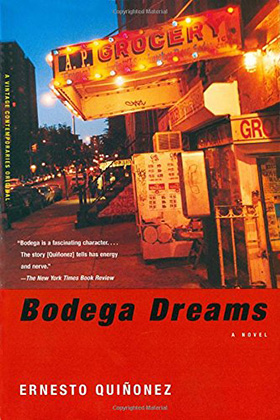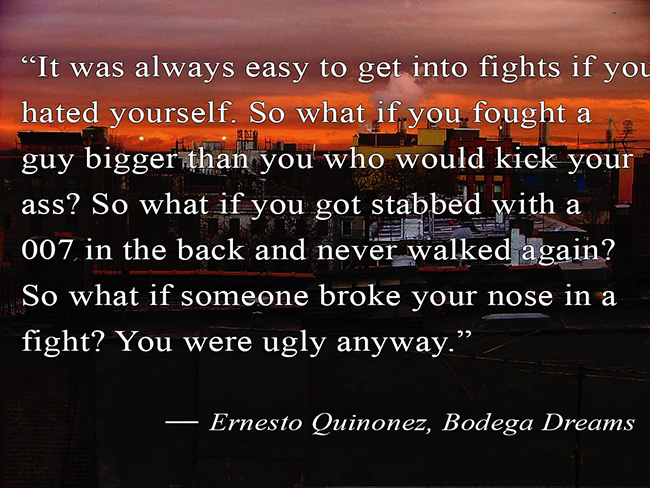
In a stunning narrative combining the gritty rhythms of Junot Diaz with the noir genius of Walter Mosley, Bodega Dreams pulls us into Spanish Harlem, where the word is out: Willie Bodega is king. Need college tuition for your daughter? Start-up funds for your fruit stand? Bodega can help. He gives everyone a leg up, in exchange only for loyalty – and a steady income from the drugs he pushes.
Lyrical, inspired, and darkly funny, this powerful debut novel brilliantly evokes the trial of Chino, a smart, promising young man to whom Bodega turns for a favor. Chino is drawn to Bodega’s street-smart idealism but soon finds himself over his head, navigating an underworld of switchblade tempers, turncoat morality, and murder.
Books Review Blog: Bodega Dreams
Growing up in NYC, there was a bodega on practically every corner of every block. For those not in the know, a bodega is your neighborhood general store where you can find just about anything from food to home essentials. A bodega was a bite-sized Walmart where the owner would know you on a first-name basis if his bodega was on your same block because of the frequent trips made there weekly, sometimes daily. My dad would always send me on errands to the corner bodega, a fool’s errand, to pick up a twelve-pack of Coors Lite, then Heineken in later years, and would have to ask the shop owner to put it on my dad’s tab. Did I tell you that I was not yet a teenager? That was the way in the barrio – the hood. Now, make no mistake, it was not a bad neighborhood in my eyes, but I can see how outsiders might perceive it to be otherwise. To me, it was just home. It was no wonder why Bodega Dreams reeled me in with its title.
Bodega Dreams by Enrique Quinonez is the story of Julio, AKA Chino, a young Puerto Rican/Ecuadorian trying to stay on the right side of the hood while growing up in the East Side of NYC, Spanish Harlem. Married to Blanca with a baby on the way, Chino tries to make ends meet with his childhood friend, the rambunctious, and unforgiving, Sapo introduces him to the crime Lord with a heart, Willy Bodega. Do you need money? Talk to Bodega. Having problems paying the rent? Talk to Bodega. Want to go to college? Talk to Bodega. Willy Bodega was the Santa Claus of the Hood and was the solution to many peoples’ problems. But Chino never asked to see him, nor did he need anything from him. On the contrary, Bodega sought Chino out because he had plans for the kid. But Chino’s no fool and says he’ll help Bodega if he does something for him in return thus their lives become entwined and Chino is thrust headfirst into Bodega’s seedy underworld.
Bodega has dreams and aspirations of cleaning up his neighborhood and helping the youth succeed despite his business of selling drugs to them. He counters that by saying that those who do drugs are not in his plans, these are the bad seeds. Quinonez paints a blurry picture of Bodega that makes it difficult for me to decide whether I liked the crime lord. One minute I understood his motives and motivation, but then his actions seemed so out of character; he would be tough and feared one minute then mushy and weak the next. There were times when Chino would insult him and talk down on him with no repercussions. I didn’t buy this. I don’t see this criminal, with the respect of the people kowtowing to a neighborhood kid, a nobody. Regardless, I let that slide and continued with the story to see where Quinonez would take me.

We get a peek inside a neighborhood often dismissed, even ignored, through our characters’ eyes. Chino is our narrator, and unlike Willy Bodega, his voice and narrative are consistent. Bodega Dreams starts strong, and then the story starts to fizzle as its conclusion drew closer, my interest started to wane, especially after Bodega’s true motivation came to fruition. All his talk about fixing the neighborhood, about being a success and earning respect, was for naught because, in the end, there was something that he deemed more viable. These other wishes and desires are pushed aside; if it weren’t for this true motivation, the story’s conclusion would not have been as strong. Yes, the ending was a punch to the throat that I did not see coming, and it saved the novel. I enjoyed a good portion of the book until I started to lose interest, but Quinonez was able to shake loose that feeling and win me over. Still, I did not see Chino’s significance in the overall story even though he was our main protagonist despite the book’s title. The book may have been better served if it were told through Bodega’s point of view with a few minor tweaks. Bodega Dreams is often compared to F. Scott Fitzgerald’s The Great Gatsby. Yes, it warrants a comparison despite this being a more modernized rendition taking place in the gritty streets of New York. Quinonez adds just enough flare to his make this interesting and keep you reading. Give this one a go, but don’t go in expecting to read about the corner store bodega like I did.
